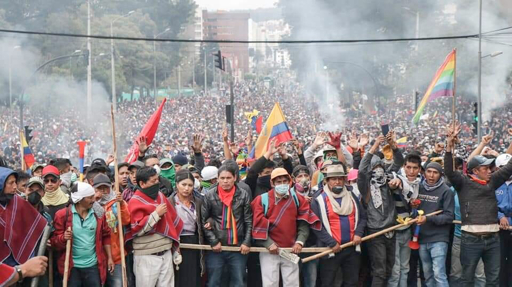Ecuador’s right-wing president, Daniel Noboa, announced that he will eliminate the state subsidy for diesel fuel.
During the two election campaigns he has participated in, Noboa promised that he would not eliminate the diesel subsidy because it would “generate inflation”. However, on September 12, a group of ministers informed the entire country about that exact measure.
In fact, although it has been a tradition for presidents to personally announce such measures, Noboa decided not to appear on camera to report on the controversial decision. Instead, four cabinet ministers announced that the elimination of the subsidy would be offset by various measures, such as providing financial assistance to more families and subsidizing public transportation to prevent fare increases, among others.
Temporary transfer of the presidency: a defensive or offensive move?
Noboa decided to temporarily move the presidency from Quito to Latacunga, in the province of Cotopaxi, in a move that many interpret as a strategy to avoid potential demonstrations in the capital – as has happened on other occasions – while others have seen the decision as a way to confront the country’s most organized Indigenous sectors in situ and thus prevent a massive protest from breaking out, like in 2019 and 2022, when the governments of Lenin Moreno (2017-2021) and Guillermo Lasso (2021-2023) attempted to eliminate various subsidies.
Prefect of Cotopaxi Lourdes Tibán, a representative of the Indigenous movement, is one of those who believe that the temporary relocation of the presidency to Latacunga seeks to nullify Leonidas Iza and his supporters; Iza is the former president of the Confederation of Indigenous Nationalities of Ecuador (CONAIE) and the leader of the 2019 and 2022 protests. Tibán added, “Fuel has made all products more expensive. Anyone who says that the rise in fuel prices and the elimination of subsidies will not harm the people is someone who has never belonged to the people.”
Social unrest
The reaction was swift. Several social movements rejected the measure because they believe it will disproportionately affect the working classes, as most engines used in agriculture and transportation run on diesel fuel. In addition, many merchants have warned that consumers will pay for the increase in product prices, and that the government has no plan to address this.
In an official statement, CONAIE strongly rejected the measure: “The elimination of the diesel subsidy will affect millions of families, peasant production, and community transportation, making the basic basket more expensive and further precarizing the lives of popular sectors. The CONAIE relies on the right to resistance in defense of the peoples and nationalities, and of the citizenry in general. It will activate all its legitimate organizational mechanisms to confront this new package of measures from DanielNoboa.”
In this regard, former CONAIE president Leonidas Iza said the measure is a direct result of the government’s alignment with the prescriptions of the International Monetary Fund (IMF) and the “subordination of the country during the governments of Moreno, Lasso, and Noboa to the United States’ agenda in Latin America, as has already been evident in other countries on the continent.”
Iza framed the move as an attack on the poorest of Ecuador. Far from these resources being allocated to the sectors announced by the government, he said the people will immediately feel the increase in ticket prices, the basic basket of goods, and the cost of living. Cutting the fuel subsidy is “nothing more than another facet of the economic terrorism with which the governments in power have sought to strike our people.”
Protests
In response to the announcement, several transport unions and associations announced that they would go on strike. Despite the announcement, transport operators in Quito quickly reached an agreement with the government and abandoned their intention to cancel urban transport.
However, several heavy goods transporters from other cities and provinces have already begun to close certain key roads. For the moment, road closures have been announced in the northern province of Carchi, and in Alóag, south of Pichincha. Heavy goods transporters claim that they have not been included in the agreements that the government has made with other transport unions.
For its part, the United Workers’ Front (FUT) announced a protest against the government for the economic policies promoted in recent months in general, and for the elimination of the subsidy in particular.
Correismo, which has opted for political struggle in parliament rather than in the streets, announced that it will scrutinize Noboa’s decision to eliminate the diesel subsidy. They have announced that they will summon the Minister of Finance and the Minister of Transportation to explain the decision: “This action responds to a prescription imposed by the International Monetary Fund, which is to reduce spending on issues such as health, education, or the elimination of subsidies, tax increases, among others,” said Viviana Veloz, coordinator of Citizens’ Revolution Movement in parliament.
For now, Ecuador is on the verge of a possible escalation of social discontent against the Noboa government. The government, on the other hand, is seeking at all costs to prevent the population’s discontent from translating into mass protests such as those of 2019 and 2022, when neoliberal governments had to backtrack on their economic policies and, in the long run, were unable to continue their political agenda.
The post Noboa eliminates the diesel subsidy. Protests announced in Ecuador appeared first on Peoples Dispatch.
From Peoples Dispatch via this RSS feed


